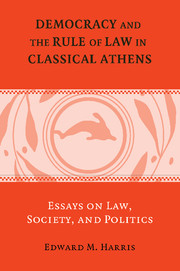Book contents
- Frontmatter
- Contents
- PREFACE
- ACKNOWLEDGMENTS
- ABBREVIATIONS
- INTRODUCTION
- I LAW AND CONSTITUTIONAL HISTORY
- II LAW AND ECONOMY
- III LAW AND THE FAMILY
- IV ASPECTS OF PROCEDURE
- 1 “In the Act” or “Red-Handed”? Apagoge to the Eleven and Furtum Manifestum
- 2 How to Kill in Attic Greek: The Semantics of the Verb (ἀπο)κτείνειν and Their Implications for Athenian Homicide Law
- 3 The Penalty for Frivolous Prosecution in Athenian Law
- V ENVOI
- BIBLIOGRAPHY
- INDEX LOCORUM
- SUBJECT INDEX
3 - The Penalty for Frivolous Prosecution in Athenian Law
Published online by Cambridge University Press: 25 February 2010
- Frontmatter
- Contents
- PREFACE
- ACKNOWLEDGMENTS
- ABBREVIATIONS
- INTRODUCTION
- I LAW AND CONSTITUTIONAL HISTORY
- II LAW AND ECONOMY
- III LAW AND THE FAMILY
- IV ASPECTS OF PROCEDURE
- 1 “In the Act” or “Red-Handed”? Apagoge to the Eleven and Furtum Manifestum
- 2 How to Kill in Attic Greek: The Semantics of the Verb (ἀπο)κτείνειν and Their Implications for Athenian Homicide Law
- 3 The Penalty for Frivolous Prosecution in Athenian Law
- V ENVOI
- BIBLIOGRAPHY
- INDEX LOCORUM
- SUBJECT INDEX
Summary
the athenians intended their courts to enforce the laws and to render justice. Lycurgus (Leocr. 4) succinctly describes the aims of the legal system: “It is the function of the law to indicate what must not be done, the task of the accuser to denounce those who are subject to the penalties set forth in the laws, and the duty of the judge to punish those whom both of these have brought before him.” In his speech against Aristogeiton, Demosthenes (25.6) reminds the court that it is their duty to show their anger by punishing crime and urges them to fulfill their role as guardians of the law (φύλακες τῶν νόμων. Cf. Dem. 24.36; Din. 3.16). The courts were not designed to be just another arena for citizens to pursue private feuds or to harass their enemies with suits lacking any legal merit.
In graphai and other public suits, the aim of the courts was to punish those who had broken the law. As Lycurgus (Leocr. 6) puts it, “it is the duty of the just citizen therefore not to bring to public trial for the sake of private quarrels people who have done the city no wrong, but to regard those who have broken the law as his own enemies and to view crimes that affect the common welfare as providing public grounds for his enmity against them.” Demosthenes (18.123) takes it for granted that “our ancestors set up these courts not for us to have you meet here to listen to us pour foul insults on each other for personal reasons, but for us to examine whether someone has done the city an injustice.”
- Type
- Chapter
- Information
- Democracy and the Rule of Law in Classical AthensEssays on Law, Society, and Politics, pp. 405 - 422Publisher: Cambridge University PressPrint publication year: 2006



